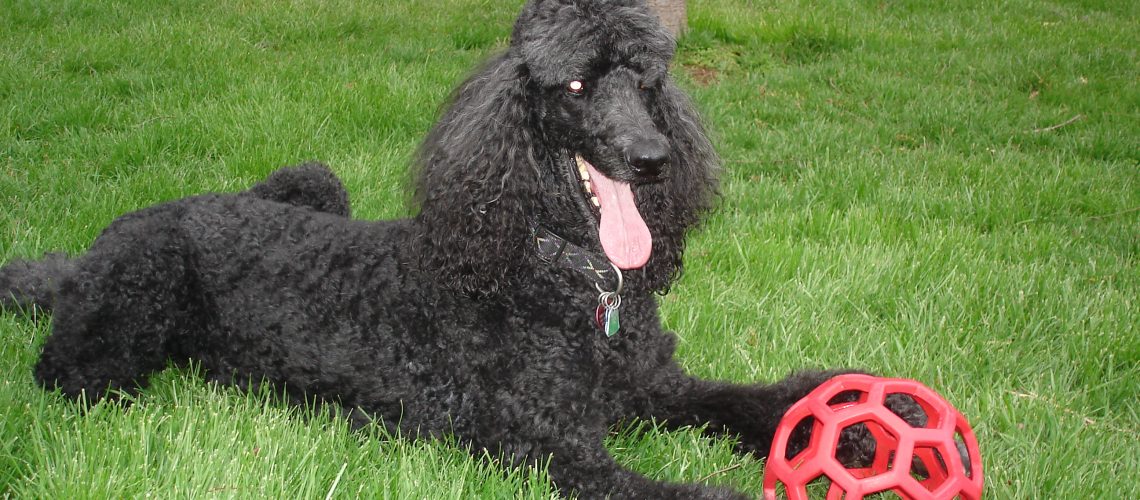“Poodles are difficult to train as guide dogs, they’re too smart.” So said the elderly blind gentleman who was holding the leash of a black standard poodle guide dog named Espresso. I had just crossed the street to meet Espresso – that’s what poodle people do – we cross streets to meet poodles. But I was disappointed because I was not allowed to pet or talk to Espresso – he was working and might get distracted.
As a poodle lover – I grew up with a white toy poodle, had a black standard for fourteen and a half years and now have a red standard poodle puppy – I always knew the breed was smart. I’ve even chuckled to myself as I raise my three twice exceptional kids over having a gifted dog. But to hear that this entire breed is challenged at doing something formulaic and rote – that was an interesting demonstration of poodle giftedness I hadn’t expected. I guess it is boring to point out a curb, pay attention to traffic signals and wait on someone hand and foot (or, in this case, paw and paw). It is more exciting to chase a ball, run after squirrels and track birds.
When I trained our first poodle I read an excellent book, The Art of Raising a Puppy, by the Monks of New Skete. It was before we had children and I remember reflecting on how useful I thought that information would be once we had kids; consistent clear messaging, high expectations, lots of overt love. What did the gifted poodle guide dog trainers know about getting gifted dogs to enjoy and succeed at doing their job? I had to find out.
So I reached out to several Guide Dog establishments to see what they had to say about smart dogs as guide dogs. I was astonished and unpleasantly surprised at the similar comments about poodles as I hear about gifted and twice exceptional kids.
Consider this comment:
“We are no longer using the breed because as a whole they have lost their work ethic, while they are very intelligent, it is difficult to get one that will learn and accept the routine and stress. To quote my mentor and oldest guide dog instructor in the world ‘It’s difficult to get inside the poodle’s head.’”
Whoa. “Lost their work ethic.” Does that smack of the failure to launch, lazy, and afraid to take risks comments we often hear about gifted and 2e kids? “Intelligent” but “difficult to get one that will learn and accept the routine and stress.” Remind anyone of the challenge gifted and 2e kids can have with rote and mundane tasks? “Getting inside the poodle’s head”…well, I’m not even sure I’ll comment on that one!
So the truth is, there are a lot of other breeds out there that guide dog associations can utilize to get the job done. And since their job is one that doesn’t require thinking outside the box, in fact they must stay firmly inside the box to make sure their charge is safe and that their outcomes are predictable, it probably is easier to choose a rule following, automaton to get the guide dog job done.
Of course the lovely gentleman I spoke with disagrees. The extra effort put into his poodle guide was well worth it for the flexibility (moving between the northeast and south, from where there are curbstones to no curbstones and other subtle adjustments necessary to guide him safely). He never had to re-train his guide dog for the different terrain. This gentleman recognizes and values his smart dog’s strengths: agility of mind, ability to adjust and think creatively, loyalty, and yes, hypoallergenic fur.
I am heartened by what another guide dog trainer had to say about poodle guide dogs: “I don’t agree with ‘they’re too smart to do the job.’ You just need to approach it right to get them to apply their intelligence to this type of work. A guide dog has to do a lot of independent thinking as opposed to other service dogs’ command and response training. You just have to take the right approach in teaching them.” Ahh, music to my ears. But still, if you don’t have to put in the extra work to get a good enough outcome from so many other breeds, why bother?
Is this what happens in classrooms all over the world? Can you imagine if our focus was on what strengths rather than what challenges our children have? On top of that, when someone gives up on a child, overtly or subtly, the child knows it. That’s their cue to stop trying, to give up on themselves and to assume they just can’t do what the others in the classroom are doing. As Susan Baum, Director of the 2e Center for Research and Professional Development says in the documentary, “2e: Twice Exceptional” when a child’s self esteem suffers this is when we find smart kids cleverly getting into crime. The shame of it is that the child can do what everyone else is being taught, but they may need to be taught in a different way utilizing their strength.
Here’s another coincidental parallel to giftedness in kids and poodles. All parents of gifted kids know to whom they can talk about their kids’ abilities and definitely with whom they can’t. The elitism label is often attached to strong intellect and potential. I know very successful adults who hide their membership in scholarly honor societies for fear of being disliked or accused of bragging. As a poodle owner I’ve been told many times that the breed is “too showy” “too beautiful” or “too striking.” What is it about natural strength that scares humans?
Enough said on this topic. I need to go tell my one-year-old standard poodle puppy to run up the stairs, grab the ball he left under the bed, and bring it down to me so we can play fetch. I love watching comprehension slide across his adorable face as he goes to find his ball.


Author: Julie F. Skolnick M.A., J.D.
Julie Skolnick, M.A., J.D., is the Founder of With Understanding Comes Calm, LLC, through which she passionately guides parents of gifted and distractible children, mentors 2e adults, and collaborates with and advises educators and professionals on bringing out the best and raising self-confidence in their students and clients.

